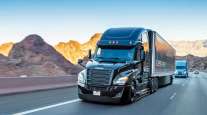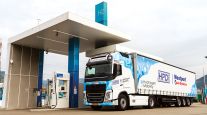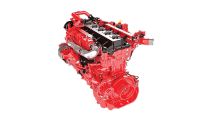Nat Gas Has Great Promise for Trucking, Summit Told
This story appears in the Dec. 10 print edition of Transport Topics.
ARLINGTON, Va. — Natural gas has tremendous potential as a trucking industry fuel, but its era for over-the-road freight hauling is just beginning, according to industry experts who addressed the Natural Gas in Trucking Summit here Nov. 29 and 30.
While a number of fleets have been experimenting with natural gas-powered trucks, appropriate equipment is only now getting close to market and fuel distributors are currently creating a national network of filling stations, the speakers said.
There are not enough equipment choices yet, and it all costs too much, speakers said, and servicing the new trucks requires extensive and expensive changes to maintenance shops, they added.
The summit, sponsored by American Trucking Associations and presented by Transport Topics, attracted some 550 industry officials to a hotel in the Washington, D.C., area.
At the summit, ATA President Bill Graves said, “Natural gas has great potential to reduce our reliance on foreign oil and create more jobs because of domestic production. Natural gas is the most viable bridge we have to the future, although we also know it will not work for everyone.”
Jerry Moyes, chairman and CEO of truckload carrier Swift Transportation Corp., said he decided to turn his company into a “guinea pig” to test natural gas and has found the process “fun,” to a degree.
Moyes said he believes the best technology choice for Swift may be a dual-fuel engine, which combines diesel fuel and natural gas in a compression engine similar to today’s diesel engines.
He also complained about the high cost of the current natural gas engines. “There’s no reason for these trucks to be as expensive as they are. We’ve got to get the costs down for these trucks,” Moyes said.
Other speakers said much of the premium cost of these trucks was related to the cost of the fuel tanks necessary to handle compressed natural gas (CNG) at great pressures or liquefied natural gas (LNG) at extremely cold temperatures.
Reggie Dupré, CEO of Dupré Logistics, said, “I see natural gas as the motor fuel of the future for Class 7 and 8 trucks” within the next few years.
“There are still some technical details to be worked out, but I think they will be worked out,” Dupré said.
Currently, the primary natural gas engines available to fleets are modified versions of diesel engines manufactured by Cummins Inc. and originally designed for medium-duty trucks and transit buses.
Bigger engines are in the manufacturing pipeline already, and many others are under design.
The intense interest in natural gas is being driven by the relatively low cost of fuel, and that the United States has the largest supply available in the world.
During the conference, investor T. Boone Pickens continued with his campaign to urge more use of natural gas. Pickens, a major shareholder of Clean Energy Fuels Corp., said natural gas made economic and environmental sense for the trucking industry (12-3, p. 1).




